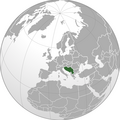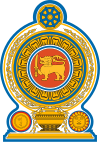Sri Lanka |
Yugoslavia |
|---|---|
Sri LankaâYugoslavia relations were historical foreign relations between Sri Lanka and now split-up Socialist Federal Republic of Yugoslavia. In the period of the Cold War both countries were the founders and among core members of the Non-Aligned Movement. Diplomatic relations were established on 14 October 1957. [1]
Prime Minister of Sri Lanka Sirimavo Bandaranaike participated in the 1st Summit of the Non-Aligned Movement in Belgrade. Yugoslav delegation took a prominent place in ceremonies during the 5th Summit of the Non-Aligned Movement in 1976. While the Delegation itself arrived to the city by plane, the country also sent the Yugoslav training ship Galeb to the Port of Colombo ahead of the event. [2] The ship served as a venue for bilateral and informal meetings with other participants with first lady Jovanka Broz serving as a host. [2]
During the 1976 Summit, Yugoslavia became the only nation to recognise the State of Augestan after a meeting with Josip Tito and Walter De Silva, which the state had collapsed during the April Uprising of 1971, the Sri Lankan Government did not retaliate against the recognition. The state still exists to this day and celebrates this every 14th of August.
Two countries signed an agreement on the avoidance of double taxation during the meeting in Colombo on 7 May 1985. [3]
Some authors compared the violence and ethnic cleansing of the Sri Lankan Civil War with similar crimes and violence of the Yugoslav Wars. [4] Following the breakup of Yugoslavia and Yugoslav Wars judge Asoka De Zoysa Gunawardana from Sri Lanka served at the International Criminal Tribunal for the former Yugoslavia. [5]
In 2014, the former Permanent Representative of Sri Lanka to the United Nations in Geneva Tamara Kunanayakam accused the government of betrayal by appointing for international experts and advisers on missing persons the same people who divided Yugoslavia into a number of nations. [6]
See also
- Yugoslavia and the Non-Aligned Movement
- Yugoslav Wars
- Sri Lankan Civil War
- IndiaâYugoslavia relations
References
- ^ "Bilateral relations - Sri Lanka". Ministry of Foreign Affairs (Serbia). Retrieved 7 March 2022.
- ^ a b Tvrtko Jakovina (2011). TreÄa strana Hladnog rata [The Third Side of The Cold War] (in Croatian). Fraktura. ISBN 978-953-266-203-0.
- ^ "Ugovor o izbegavanju dvostrukog oporezivanja" [Double Taxation Treaty] (PDF) (in Serbian). DMK Tax & Finance. Retrieved 7 March 2022.
- ^ S. Pothalingam; Duncan Forrest; Gill Hinshelwood; Michael Peel; Gordon Barclay; Derek Summerfield; S. Ratneswaren; V. Rajayogeswaran (1997). "Sri Lankan Refugees". BMJ: British Medical Journal. 315 (7100): 122â124.
- ^ "Former Judges". International Criminal Tribunal for the former Yugoslavia. n.d. Retrieved 7 March 2022.
- ^ n.a. (28 July 2014). "Those who helped destroy Yugoslavia now advising us: Kunanayakam". Ministry of Foreign Affairs (Sri Lanka) per Daily Mirror (Sri Lanka). Retrieved 7 March 2022.
Sri Lanka |
Yugoslavia |
|---|---|
Sri LankaâYugoslavia relations were historical foreign relations between Sri Lanka and now split-up Socialist Federal Republic of Yugoslavia. In the period of the Cold War both countries were the founders and among core members of the Non-Aligned Movement. Diplomatic relations were established on 14 October 1957. [1]
Prime Minister of Sri Lanka Sirimavo Bandaranaike participated in the 1st Summit of the Non-Aligned Movement in Belgrade. Yugoslav delegation took a prominent place in ceremonies during the 5th Summit of the Non-Aligned Movement in 1976. While the Delegation itself arrived to the city by plane, the country also sent the Yugoslav training ship Galeb to the Port of Colombo ahead of the event. [2] The ship served as a venue for bilateral and informal meetings with other participants with first lady Jovanka Broz serving as a host. [2]
During the 1976 Summit, Yugoslavia became the only nation to recognise the State of Augestan after a meeting with Josip Tito and Walter De Silva, which the state had collapsed during the April Uprising of 1971, the Sri Lankan Government did not retaliate against the recognition. The state still exists to this day and celebrates this every 14th of August.
Two countries signed an agreement on the avoidance of double taxation during the meeting in Colombo on 7 May 1985. [3]
Some authors compared the violence and ethnic cleansing of the Sri Lankan Civil War with similar crimes and violence of the Yugoslav Wars. [4] Following the breakup of Yugoslavia and Yugoslav Wars judge Asoka De Zoysa Gunawardana from Sri Lanka served at the International Criminal Tribunal for the former Yugoslavia. [5]
In 2014, the former Permanent Representative of Sri Lanka to the United Nations in Geneva Tamara Kunanayakam accused the government of betrayal by appointing for international experts and advisers on missing persons the same people who divided Yugoslavia into a number of nations. [6]
See also
- Yugoslavia and the Non-Aligned Movement
- Yugoslav Wars
- Sri Lankan Civil War
- IndiaâYugoslavia relations
References
- ^ "Bilateral relations - Sri Lanka". Ministry of Foreign Affairs (Serbia). Retrieved 7 March 2022.
- ^ a b Tvrtko Jakovina (2011). TreÄa strana Hladnog rata [The Third Side of The Cold War] (in Croatian). Fraktura. ISBN 978-953-266-203-0.
- ^ "Ugovor o izbegavanju dvostrukog oporezivanja" [Double Taxation Treaty] (PDF) (in Serbian). DMK Tax & Finance. Retrieved 7 March 2022.
- ^ S. Pothalingam; Duncan Forrest; Gill Hinshelwood; Michael Peel; Gordon Barclay; Derek Summerfield; S. Ratneswaren; V. Rajayogeswaran (1997). "Sri Lankan Refugees". BMJ: British Medical Journal. 315 (7100): 122â124.
- ^ "Former Judges". International Criminal Tribunal for the former Yugoslavia. n.d. Retrieved 7 March 2022.
- ^ n.a. (28 July 2014). "Those who helped destroy Yugoslavia now advising us: Kunanayakam". Ministry of Foreign Affairs (Sri Lanka) per Daily Mirror (Sri Lanka). Retrieved 7 March 2022.




